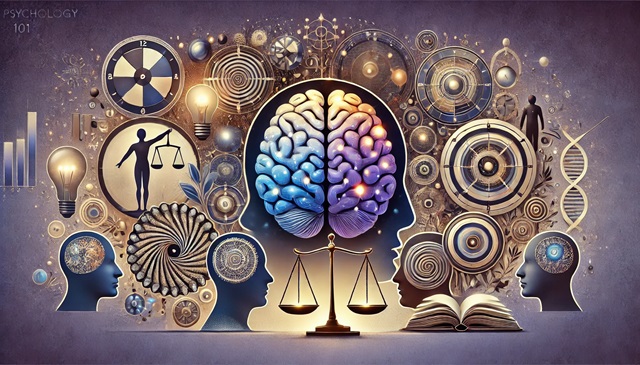Predicting Behavior
By having an understanding about one's personality type and traits, it is easier to predict a person's behavior. For example, if you know that someone has a Type A personality and is very competitive, you may not even want to engage in such activities that would pit the two of you together. Not that you would not stand up to the challenge, but the Type A personality also has traits that indicate he or she will not take it lightly if you come out ahead, and that could damage the relationship.
As we will continue learning, the more we know about personality development, the better able we are to use that information in our personal and professional relationships and endeavors. How did we get to this point of studying personality?
However, Carl Gustav Jung, who collaborated with Freud, helped to lay the foundation of where a lot of personality development work began. Jung and Freud's work are believed by many to have converged together in many areas.
Who Is This Jung Guy, Anyway?
Carl Jung is believed to be one of the most important names in the field of personality psychology. He was a Swiss psychiatrist who was born in 1875 and died in 1961. He was the founder of what people refer to Jungian psychology, or analytical psychology.
His work is important to the study of personality development because he has proposed so many concepts and theories. The theories that he developed lay the foundation for what would later become the Myers-Briggs Type Indicator (MBTI) that you have already learned about.
Additionally, Jung is well-known for his research and theories regarding dreams.
Making Decisions
When it comes to making decisions, some people may be quick to decide and others may want to know all the facts and weigh the options. Neither route is right or wrong. They are just different and representative of the various personalities that exist within our society. Knowing your personality type, or that of those around you, can be helpful in understanding how they make decisions.
Did You Know?
While you may be familiar with the concept of writing down all the pros and cons in making a decision, there are many other methods that are used. Some may engage in starbursting, decision trees, or even using a grid analysis.
One of the greatest assets in understanding your own personality is when it comes to career choice. When you think about the number of hours in your life that you will spend at work, it is important to make sure that you enjoy what you do. Understanding your personality type can help match you with a career that you will like rather than loathe.
Career Examples and Exploration
Now that you have identified what your own personality type is, you can do some online searches for that type and career information. Doing this will provide lists of information and suggested careers that someone with your personality type would enjoy.
Matching your personality to your career is important if you want to have job satisfaction and succeed in what you do. For example, let us say you are someone that is an introvert, meaning that you would prefer to work alone and do not care for all the stimulation of working in a loud and busy atmosphere. In this case, you would not be happy with a career being a restaurant server, public relations agent, or working in other positions that put you in contact with many people.
On the other hand, extroverts will find themselves extremely bored and unfulfilled in a position in which they work alone and do not get opportunities to interact with others. At the same time, introverts may find they are over-stressed and unhappy in a position that has them working with the public or around many people on a regular basis. Because of this, it is important to match one's personality with a career. It will help increase job satisfaction, performance, and chances for success.
The Importance of Self-efficacy
How much do you believe in yourself and your ability to achieve? That is what self-efficacy is about: the belief in your capabilities in being able to achieve goals or a specific outcome. While you may have not been familiar with this term, it has been a big part of your life.
Self-efficacy influences the efforts you put forth, the choices you make, whether you are persistent when challenges arise, and how you feel about things. One's self-efficacy develops from a variety of places, including:
Verbal persuasion: This refers to the things people say to us. If you receive compliments about the way you do things, you will grow to feel that you can achieve your goals or the tasks that need doing. If you receive verbal messages that you do not measure up, you will have difficulty reaching your goals because you will not believe in yourself enough.
Mastery experience: This is the most powerful source of building self-efficacy. It comes as a result of someone achieving something. Once people see firsthand that they are capable of doing things and reaching goals, their self-efficacy increases.
Vicarious experience: This boost in self-efficacy comes as a result of watching someone else you know succeed at something or reach a goal. It makes you feel as though if that person can do it, so can you.
Emotional state: The emotional state or mood that someone is in will impact his or her self-efficacy. If someone is in a good mood, that person will feel better able to achieve things. People who feel down or worried do not feel they can reach their goals.
Moving Ahead
In this section, you learned how matching your personality type to your career is not only beneficial but easier to do than you may have thought. You also learned about self-efficacy. This may be especially helpful if you find that you often doubt your abilities. If you have an idea of how you may have come to believe that, you can now identify the problem and work to make changes.
When it comes to using personality development information in choosing a career, it is important to note that you could also use it to help other people find the right career. If learning about personalities interests you, then you may want to consider a career in that field. Many people who are looking for assistance in choosing the right career seek out such coaches and services. Your job would be to gather information about their personality and make appropriate suggestions as to where they would do well.
Changing Your Personality
Personality Changes
Can you change your personality? When it comes to changes, you obviously have the ability to change the results you get from a personality test. After all, you would just need to answer the questions differently. The results will give you a different personality type, but that does not mean it is the true you.
The psychologist Carl Jung believed that everyone has one true personality type. While you can change particular behaviors and control your emotions, you never actually change that true type of your personality. Many believe that by the time you are around 30 years old, your "true type" personality is set.
Even if you change behaviors and control your emotions in an effort to respond differently to people, the root of your feelings and behaviors remains unchanged. The roots are still that of your true type.
Your true type personality took years to develop. Starting at birth and going into adulthood, the experiences of nature and nurturing you went through helped to develop the personality you would have as an adult. It is especially important for people who have children or work around them to realize that they are helping to lay the foundation of who that person is and will become for the rest of their life.
Modern Thinking
While the "true type" theory that your personality is set around age 30 is still widely known and many adhere to that idea, there is also a more modern school of thought on the issue. Some recent research suggests that people are able to change their personality traits, which would help make a change to their overall personality.
If you wanted to change your personality, you would need to consider the following:
- Think about what you want to change and why. To be able to successfully change your personality, you need the changes to be for you, not for other people. If someone else wants you to change something, it is not likely going to work. You have to want the change for you and feel you need it.
- Focus on changing just one personality trait. Think about the Big Five personality traits . Choose one thing to focus on and create a list of all the things you can do to start the process. For example, if you are an introvert and want to become an extrovert, set a goal to reach out and talk to others five times per day.
- Be patient. Making a change to your personality is not going to happen quickly. Set some goals, work toward and measure them, but be patient and give yourself time to start feeling comfortable taking on the new role.
- Get help. You can get the help of others to keep you on track or steer you in the right direction. Those closest to you can help identify the desired behavior. It can also be beneficial to work with a life coach or counselor.
Glorious Individuality
In studying personality development, it is important to not only notice, but to appreciate that everyone is different. Each of us has experiences that have led to creating the person we are today. Our individuality is a good thing, even if we may come across some people that we wish we could change.
Positive Attitude and Controlling Emotions
We may not be able to control everything that happens around us, but we can learn to become good at controlling the way we respond to it. Making a goal to have a positive attitude can go a long way toward helping to give you a happier, more easygoing personality, as well as helping to control your emotions if something happens that you do not care for.
Learning to have a positive attitude can take some practice. However, you can learn to make it a regular part of your life. Try keeping a gratitude journal: Wake up every morning and write in the journal the things you are happy and appreciative about for that day. It will begin to serve as a reminder of all the good things you have going on in your life.
In the End
When it comes down to it, there is no definitive answer on whether you can change your personality. For the longest time, the school of thought was that you could not because by adulthood it was set and that you have a true type that remains, even if you change some of your behaviors. Today, some researchers are challenging that notion and saying that you can change some personality traits, which would lead to overall personality changes.
More research will continue to be done on this matter in personality development. In the meantime, if you want to change something about your personality, or help someone else make a change, it certainly cannot hurt to define the issue, set some goals, and try to make some changes.






























